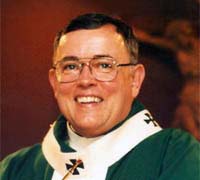【慈幼通訊社 ─ 2009年7月23日美國科罗拉多斯普林斯訊】 ─ 丹佛教區 Charles Chaput 主教,在天主教商人組織「教宗特使」的聚會中發表演說,促請教徒了解傳媒的運作及畫面背後隱藏的故事。
 Zenit 報導了 Chaput 主教於七月八日發表的演說,特別引述主教對傳媒具批判性的分析,揭示美國當前的實況。
Zenit 報導了 Chaput 主教於七月八日發表的演說,特別引述主教對傳媒具批判性的分析,揭示美國當前的實況。
互聯網及二十四小時新聞節目,不但徹底改變了新聞製作模式,不再局限於早、午及晚出版或報導,更改變了大眾攝取訊息的方法。主教指出,在現今具主導地位的電子影像媒體,不斷需要相關的內容。這些節目追求簡潔、快捷、變通、急切、多變及搧情。然而思考卻相反。思考需要時間,需要靜默及有條理的邏輯思維。
主教在確認科技的進步能有助人類汲取更多訊息的同時,亦指出「科技也削弱我們在印刷媒體時代的鍛鍊智慧的能力。這並非正面的發展。事實上,在民主社會這是十分危險的,因為政府是要依賴人民成熟的智慧及道德而生存的。」科技所帶來的進步,或會將一切斷送。「這或許會帶來料想不到的結果,因此我們需要對我們的新聞媒體更加警惕,留意提供的訊息內容對大眾生活的影響。」
主教明確指出,我們首要保護出版及宗教的自由,他補充:「縱使新聞傳媒強調公正性和良好的工作,而他們也經常做到,然而卻像其他行業一樣,會流於偏見、無知、低級趣味以及宗族主義。但與其他行業不同,媒體有自我保護能力,他們有雄厚的實力,介入我們的思考模式和內容、喜惡及關注點。」
接著,他把傳媒描述為「歷史上最龐大的思維指引集團。這股勢力縱使不致令我們感到不安,但我們至少也應保持一份警覺。」
Catholics and the Mass Media
(ANS – United States - Colorado Springs, 23 Jul 2009 ) – Archbishop Charles Chaput of Denver, speaking at a meeting of “Legatus”, an organisation of Catholic business men, urged Catholics to understand how the media operates and what goes on behind the scenes.
In his address given on 8 July and reported by Zenit, Archbishop Chaput, referring to the current situation in the US, gave a very critical analysis of the media.
Internet and 24 hour news programmes have not only changed radically the production of news programmes, once limited to a morning, afternoon and evening edition of a newspaper, but also the way in which the public obtains its information. The Archbishop pointed out how visual and electronic media, today’s dominant media, need a certain kind of content. They thrive on brevity, speed, change, urgency, variety and feelings. But thinking requires the opposite. Thinking takes time. It needs silence and the methodical skills of logic.
While recognising the advantages of advances in technology which have increased the sources of human information, the Archbishop notes “they have also undermined the intellectual discipline that we once had when our main tools of communication were books or print publications. This is not a good development. In fact, it’s a very dangerous thing in a democracy, which is a form of government that demands intellectual and moral maturity from its citizens to survive.” Material progress gives, and it takes away. “And it always has unintended consequences, which means we need to be more – not less – vigilant about the way our news media form us, and how their influence shapes the content of our public life.”
Recalling that freedom of the press and freedom of religion are explicitly singled out for protection by the First Amendment, Archbishop adds: “The news media, despite their claims of impartiality, and despite the good work they often do accomplish, are just as prone to prejudice, ignorance, bad craftsmanship and tribalism as any other profession. But unlike other professions, the press has constitutional protections. It also has real power in shaping how we think, what we think about and what we like, dislike and ignore.”
He goes on to describe the media as “the greatest catechetical syndicate in history. And if that kind of power doesn’t make us uneasy, it should at least make us alert.”